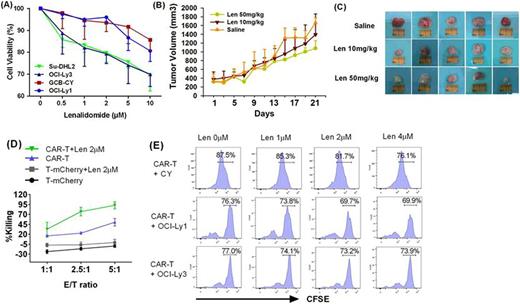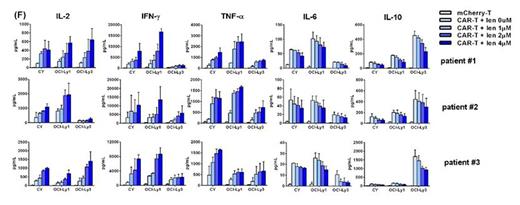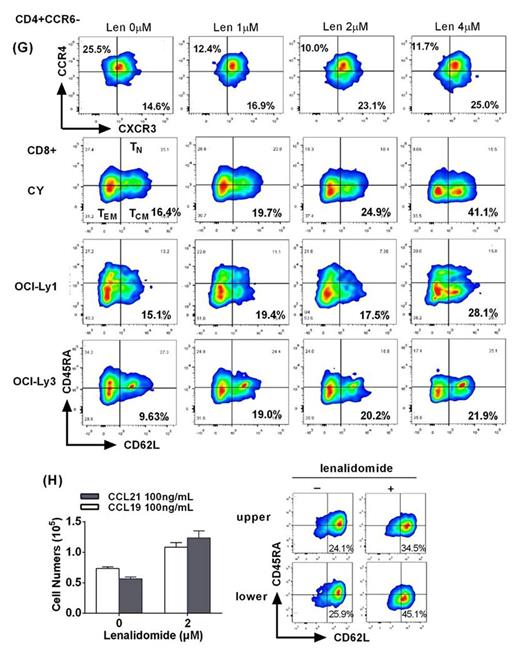Abstract
Background
CD19-CAR T cells with costimulatory ligand of CD28 or 4-1BB have acquired well response in ALL and CLL, whereas it shows less effective in B-cell NHL. The microenvironment of lymphomas is much more complicated than that of leukemia, which containing physical barriers and higher immunosuppression levels preventing lymphoma cells from T cell attack. To overcome such T cell toleration, one can optimize T cell fitness by adding co-stimulatory domain or polarizing T cell differentiation. Some pre-clinical studies have reported the 3rd generation of CD19-CAR T cells with CD28 and 4-1BB domain in treating ALL, but the results were in controversy. Lenalidomide has been proved to have direct anti-tumor effects in killing DLBCL cell lines except its immunomodulatory functions. Therefore, we did preliminary investigation in vitro to seek whether the combination of lenalidomide and CD19 CAR-T cells with both CD28 and 4-1BB costimulatory domain could acquire better effects
Method
We first verified the proliferation inhibition of lenalidomide in treating both ABC-DLBCL cell lines (Su-DHL2 and OCI-Ly3) and GCB-DLBCL cell line OCI-Ly1. CY cell was primary cells isolated from GCB-DLBCL patients in Rui-jin Hospital. Under the maximum observed plasma concentration of lenalidmomide (2.2¦ÌM), the growth inhibition in both GCB-CY and OCI-Ly1 cell line was minimal, whereas the impact on ABC-DLBCL cell lines was more obvious. We further examined the efficiency of lenalidomide in vivo using a patient-derived mouse model. The primary lymphoma cells were obtained from a ABC-DLBCL patient and subcutaneously transplanted into NOD/SCID mouses. However, daily treated with lenalidomide could not delay the tumor growth (p>0.05) (Fig A, B, C). We next isolated CD3+ T cells from healthy donors, expanded with CD3/CD28 beads. The pLenti-EF1¦Á-CD19-28-BB-¦Æ-mcherry lentiviral vectors was generated and transduced in the expanded T cells to generate CD19 CAR-T cells. T cells transduced with pLenti-EFI¦Á-Actin-mcherry lentiviral vector were used as control. CD19-CAR T cells and T cells transdued with Actin-mcherry were pretreated with 2¦ÌM lenalidomide for 72 hours. LDH assay was then performed to identify the cytotoxicity of CD19-CAR T cells against CY in 7 hours. We found that lenalidomide substantially enhanced the anti-tumor function of CD19 CAR T cells and it also promoted the CD19-CAR T cells proliferation to some extent (Fig D, E). We therefore used three DLBCL patients CAR-T cells to identify the cytokine secretion. It was found that lenalidomide promoted Th1-biased cytokines secretion (IL-2, IFN-¦Ã, TNF-¦Á) and decreased Th2-biased cytokines (IL-6, IL-10). Interestingly, CAR-T cells secreted less IFN-¦Ã and TNF-¦Á but more IL-6 and IL-10 in killing OCI-Ly3 compared with OCI-Ly1 and CY (Fig F). The results leaded us to next determine the CD19-CAR T cell differentiation. A comparable increase of CD8+CD45RA-CD62L+ CD19 CAR T cells was observed as well as the CD4+CCR6-CCR4-CXCR3+ subset, indicating lenalidomide could induce CD19 CAR T cells differentiate to CD8+ central memory T cells and Th1 cells (Fig G). As the central memory T cells are more likely to home to the lymph nodes, we found that lenalidomide considerably increased the CD19-CAR T cell migration toward CCL21 and CCL19 in transwell system (Fig H).
Conclusion
In conclusion, our results indicate that lenalidomide could polarize CD19-CAR T cells to CD8 TCM and Th1 subset, which might contribute to the enhanced antitumor function of CD19 CAR-T cells. Meanwhile, by overexpressed CD62L, lenalidomide could promote the migrating capability of CD19 CAR-T cells. More in-vivo work shall be done to determine the combination therapy in the future.
No relevant conflicts of interest to declare.
Author notes
Asterisk with author names denotes non-ASH members.




